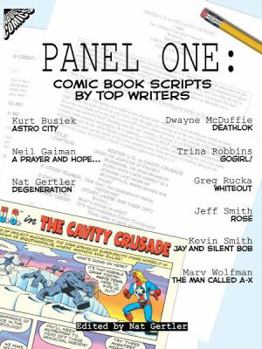Panel One: Comic Book Scripts by Top Writers
Select Format
Select Condition 
Book Overview
Contains annotations, plots, interviews, and scripts by many of comics' hottest writers, including Kurt Busiek, Neil Gaiman, Greg Rucka, Kevin Smith, Jeff Smith, Marv Wolfman, and more.
Format:Paperback
Language:English
ISBN:0971633800
ISBN13:9780971633803
Release Date:May 2002
Publisher:About Comics
Length:200 Pages
Weight:1.14 lbs.
Dimensions:0.5" x 8.5" x 11.0"
Customer Reviews
5 ratings
from words to pictures
Published by Thriftbooks.com User , 14 years ago
It's very instructive to see how differently every writer approaches his or her script; as Nat Gertler says in his introduction, comic book scripts are direct lines between writers and artists, and each particular relationship influences the way that communication works. Sometimes it reads like a story pitch, and sometimes it's all visual descriptions. There's not a single "correct" or standard way to write these things. I was highly amused by the fact that Greg Rucka felt the need to include actual endnotes in his script for Whiteout: Melt. Neil Gaiman and Kurt Busiek are brilliant, even in this stripped-down presentation. And Kevin Smith's script is about what you'd expect.
Really great but...
Published by Thriftbooks.com User , 16 years ago
This book is amazing. It is a real pleasure to read these scripts and to admire the different styles. This is truly inspiring but... What is this ugly cover ? Why is the inside presentation so cheap ? I'm sure there are a lot of explanations, but, in case you re-edit it, would be a good idea to make this jewel shine. Thanks a lot mister Gertler.
GREAT FOR THE ASPIRING COMIC WRITER!
Published by Thriftbooks.com User , 21 years ago
This is a great text that takes you through the creative process of several unique writing styles. The variety of script and drawings from a host of authors, really made this book encouraging to the aspiring comic writer. I'm looking forward to getting Panel Two when it comes out.
Why didn't some body think of this sooner?
Published by Thriftbooks.com User , 22 years ago
It seems like such an obvious good idea.It's a wonderful glimpse into the creative process.Just received it last night, and I'm already half through it. I haven't done that since I was eleven and got Stan Lee's How to Draw Comics the Marvel Way. Not that this book has any similarity to that one. This is not a how to book. Its a more intimate, than any instructional book. Its a similar difference in experience to watching a biography to reading someones private correspondence. The presentation adds to the feeling as well. Better than seeing pencils, better than watching a demo, or hearing someone try to explain the creative process. You actually see it and are part of it because this is what the artist sees, while he is in the process. As a comic book fan for years and creative hopeful (which I believe is a large part of the intended audience), I hope this is first in a long line.Great job, thanks Mr. Gertler.
Cool, helpful, worth the read
Published by Thriftbooks.com User , 22 years ago
One thing that's bugged me in my various efforts at writing a comic book script is that no reference I checked seemed to agree as to what format is right. As this book explains, that's because there IS no "right" or "wrong" format, just different ways to do it.Every script in this volume shows you something. Gaiman's reads like a personal note to the artist, Wolfman shows how plot-first can work, McDuffie shows you how to work in a recap, Kevin Smith shows a more movie-script style of writing and Kurt Busiek's entry... heck, when I read the original comic book I thought it was one of the greatest comic book stories I ever read, but the script for "The Nearness of You" just made it all the more powerful.If you want to try to write comics, you could do a lot worse than picking up this book.






